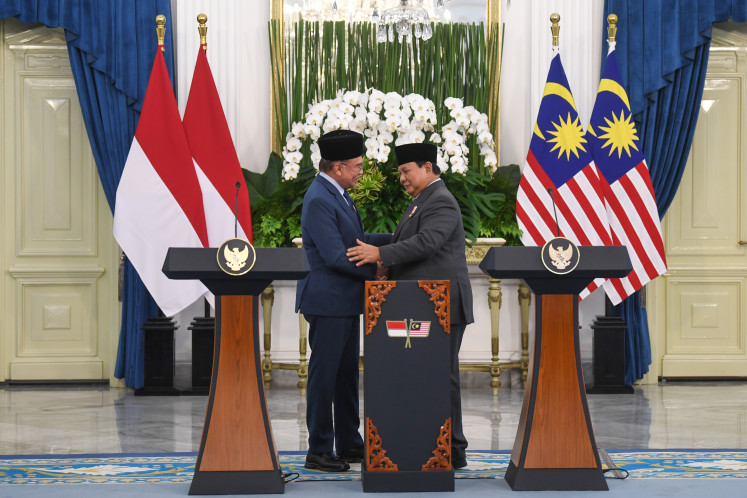Popular Reads
Top Results
Can't find what you're looking for?
View all search resultsPopular Reads
Top Results
Can't find what you're looking for?
View all search resultsInsight: RI-Malaysia relations: Can't we stop being ridiculous?
People often say it is natural for relationships between two close neighbors to experience ups and downs
Change text size
Gift Premium Articles
to Anyone

People often say it is natural for relationships between two close neighbors to experience ups and downs. The relationship between Indonesia and Malaysia is no exception. While bilateral relationships are generally good, disputes over a variety of issues occasionally cause disruptions.
In 2003, for instance, a diplomatic row erupted between the two countries over the fate of undocumented Indonesian migrant workers in Malaysia. In 2005, relations turned sour again after Malaysia claimed jurisdiction over Indonesia's territory of Ambalat in the Sulawesi Sea.
It is perfectly understandable if both countries tend to quarrel over these kind of issues. These are issues where the question of sovereignty and national pride are at stake. However, the quarrel between the two countries is not confined to such substantial issues. It has now gone too far, including squabbles over many other trivial and often ridiculous issues.
One issue over which the two countries persistently squabble is the ownership of songs, dances and food. The most infamous case, of course, is over the ownership of folk song "Rasa Sayang(e)" (The Feeling of Love), which Malaysia claims is a Malay song. Indonesians, on the other hand, contend the song originates from the island of Maluku in eastern Indonesia. Because of this squabble, some Indonesians have called for a boycott of Malaysian products.
But this is still not as puzzling as the latest call by the association of Malaysian music industry employees, Karyawan, to restrict radio broadcasts of Indonesian songs to a mere 10 percent of Malaysian airtime (The Jakarta Post, Sept. 5, 2008).
Apparently this move was a follow-up to a decision by Malaysia's state broadcaster last year to cut back on Indonesian songs on its airwaves. Malaysian officials also urged private broadcasters not to be obsessed with playing Indonesian songs on their radio stations.
On the surface, the demand can be seen as an attempt by Malaysia to promote its own music industry in the national context. However, this kind of demand, if endorsed by the government of Malaysia, would not be helpful for efforts to strengthen bilateral relations between the two countries. It would only add to existing perceptions among many Indonesians that Malaysia does in fact harbor ill feelings against Indonesia.
Ordinary Indonesians would be hard-pressed to understand such an attitude on Malaysia's part. Remember the slogan Ganyang Malaysia, Selamatkan Nurhaliza (Crush Malaysia, Save Nurhaliza) during the height of the Ambalat dispute last year? Many Indonesians still love Siti Nurhaliza. Malaysian rock star Amy Search was once a popular singer Indonesia for many years. No one told Indonesians not to be obsessed with both singers. Therefore it's difficult to understand why Malaysia needs to cut down on the airing of Indonesian songs to the domestic audience, especially when many Indonesians believe Malaysia has often tried to "steal" Indonesian culture, arts and even territory.
Indeed, both Indonesians and Malaysians need to realize that mutually negative misperceptions and stereotyping already pose a major threat to bilateral relations. Many in Indonesia feel we are continuously treated with little respect by Malaysia. A survey in 2007 found 40.9 percent of respondents believed Malaysia often ridiculed Indonesia, and another 20.5 percent said Malaysia was arrogant. On the other hand, Malaysians feel it is we, not they, who are guilty of arrogance. They believe we still behave like a big brother and resent the fact that "the little brother" is now far more successful.
I have often said that the rational foundation of Indonesia-Malaysia bilateral relations is strong. For instance, we share common security interests in the Malacca Straits. We share common interests in strong and deep economic cooperation. We share strong interests in eradicating global misperceptions of Islam.
Therefore the bilateral relationship has to be freed from ridiculous squabbles over trivial issues. We need to build a rational foundation for stronger bilateral ties. We should avoid invoking sentimental or romantic bases for the relationship, as implied in the serumpun concept (originating from the same cultural roots). What we need to manage here is the relationship between two neighboring countries, not between two lovers.
In other words, the relationship between the two nations should be about the management of national interests, not about fighting over trivial matters. Nor should it be about the cultivation of sentimental feelings. Both countries carry equal blame for promoting ridiculousness in the relationship. For that, both sides need to stop being ridiculous. Unfortunately, on the demand to restrict the airing of Indonesian songs, that applies more to Malaysia than Indonesia.
The writer is the deputy executive director of the Center for Strategic and International Studies in Jakarta.









